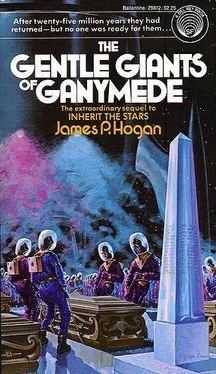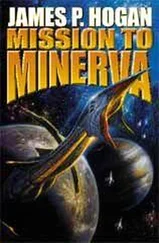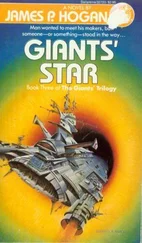The woman looked helplessly at the table for a second, then made a gesture of resignation. "Okay. . . If you put it like that, I guess it doesn't make sense."
"Thank you," Danchekker acknowledged stonily.
Henri Rousson leaned forward and poured himself a glass of water from the pitcher standing in the center of the table. He took a long drink while the others continued to stare thoughtfully through the walls or at the ceiling.
"Let's go back to basics for a second and see if that gets us anywhere," he said.'We know that the Ganymeans evolved on Minerva--right?" The heads around him nodded in assent. "We also know that the Ganymeans must have visited Earth because there's no other way they could have ended up with terrestrial animals on board their ship--unless we're going to invent another hypothetical alien race and I'm sure not going to do that because there's no reason to. Also, we know that the ship found here on Ganymede had come to Ganymede from Minerva, not directly from Earth. If the ship came from Minerva, the terrestrial animals must have come from Minerva too. That supports the idea we've already got that the Ganymeans were shipping all kinds of life forms from Earth to Minerva for some reason."
Paul Carpenter held up a hand. "Hang on a second. How do we know that the ship downstairs came here from Minerva?"
"The plants," Fichter reminded him.
"Oh yeah, the plants. I forgot. . ." Carpenter subsided into silence.
The pens and animal cages in the Ganymean ship had contained vegetable feed and floor-covering materials that had remained perfectly preserved under the ice coating formed when the ship's atmosphere froze and the moisture condensed out. Using seeds recovered from this material, Danchekker had succeeded in cultivating live plants completely different from anything that had ever grown on Earth, presumed to be examples of native Minervan botany. The leaves were very dark--almost black--and absorbed every available scrap of sunlight, right across the visible spectrum. This seemed to tie in nicely with independently obtained evidence of Minerva's great distance from the Sun.
"How far," Rousson asked, "have we got in figuring out why the Ganymeans were shipping all the animals in?" He spread his arms wide. "There had to be a reason. How far are we getting on that one? I don't know, but the enzyme might have something to do with it."
"Very well, let's recapitulate briefly what we think we already know about the subject," Danchekker suggested. He moved away from the screen and perched on the edge of the table. "Paul. Would you like to tell us your answer to Henri's question." Carpenter scratched the back of his head for a second and screwed up his face.
"Well . . ." he began, "first there's the fish. They're established as being native Minervan and give us our link between Minerva and the Ganymeans."
"Good," Danchekker nodded, mellowing somewhat from his earlier crotchety mood. "Go on."
Carpenter was referring to a type of well-preserved canned fish that had been positively traced back to its origin in the oceans of Minerva. Danchekker had shown that the skeletons of the fish correlated in general arrangement to the skeletal remains of the Ganymean occupants of the ship that lay under the ice deep below Pithead Base; the relationship was comparable to that existing between the architectures of, say, a man and a mammoth, and demonstrated that the fish and the Ganymeans belonged to the same evolutionary family. Thus if the fish were native to Minerva, the Ganymeans were, too.
"Your computer analysis of the fundamental cell chemistry of the fish," Carpenter continued, "suggests an inherent low tolerance to a group of toxins that includes carbon dioxide. I think you also postulated that this basic chemistry could have been inherited from way back in the ancestral line of the fish--right from very early on in Minervan history."
"Quite so," Danchekker approved. "What else?"
Carpenter hesitated. "So Minervan land-dwelling species would have had a low CO 2 tolerance as well," he offered.
"Not quite," Danchekker answered. "You've left out the connecting link to that conclusion. Anybody. . . ? " He looked at the German. "Wolfgang?"
"You need to make the assumption that the characteristics of low CO 2 tolerance came about in a very remote ancestor--one that existed before any land-dwelling types appeared on Minerva." Fichter paused, then continued. "Then you can postulate that this remote life form was a common ancestor to all later land dwellers and marine descendants--for example, the fish. On the basis of that assumption you can say that the characteristic could have been inherited by all the land-dwelling species that emerged later."
"Never forget your assumptions," Danchekker urged. "Many of the problems in the history of science have stemmed from that simple error. Note one other thing too: If the low-C0 2 -tolerance characteristic did indeed come about very early in the process of Minervan evolution and survived right down to the time that the fish was alive, then suggestions are that it was a very stable characteristic, if our knowledge of terrestrial evolution is anything to go by anyway. This adds plausibility to the suggestion that it could have become a common characteristic that spread throughout all the land dwellers as they evolved and diverged, and has remained essentially unaltered down through the ages--much as the basic design of terrestrial vertebrates has remained unchanged for hundreds of millions of years despite superficial differences in shape, size and form." Danchekker removed his spectacles and began polishing the lenses with his handkerchief.
"Very well," he said. "Let us pursue the assumption and conclude that by the time the Ganymeans had evolved--twenty-five million years ago--the land surface of Minerva was populated by a multitude of its own native life forms, each of which possessed a low tolerance to carbon dioxide, among other things. What other clues do we have available to us that might help determine what was happening on Minerva at that time?"
"We know that the Ganymeans were quitting the planet and trying to migrate someplace else," Sandy Holmes threw in. "Probably to some other star system."
"Oh, really?" Danchekker smiled, showing his teeth briefly before breathing on his spectacle lenses once more. "How do we know that?"
"Well, there's the ship down under the ice here for a start," she replied. "The kind of freight it was carrying and the amount of it sure suggested a colony ship intending a one-way trip. And then, why should it show up on Ganymede of all places? It couldn't have been traveling between any of the inner planets, could it?"
"But there's nothing outside Minerva's orbit to colonize," Carpenter chipped in. "Not until you get to the stars, that is."
"Exactly so," Danchekker said soberly, directing his words at the woman. "You said' suggested a colony ship.' Don't forget that that is precisely what the evidence we have at present amounts to--a suggestion and nothing more. It doesn't prove anything. Lots of people around the base are saying we now know that the Ganymeans abandoned the Solar System to find a new home elsewhere because the carbon-dioxide concentration in the Minervan atmosphere was increasing for some reason which we have yet to determine. It is true that if what we have just said was fact, then the Ganymeans would have shared the low tolerance possessed by all land dwellers there, and any increase in the atmospheric concentration could have caused them serious problems. But as we have just seen, we know nothing of the kind; we merely observe one or two suggestions that might add up to such an explanation." The professor paused, seeing that Carpenter was about to say something.
Читать дальше









![Nicholas Timmins - The Five Giants [New Edition] - A Biography of the Welfare State](/books/701739/nicholas-timmins-the-five-giants-new-edition-a-thumb.webp)
